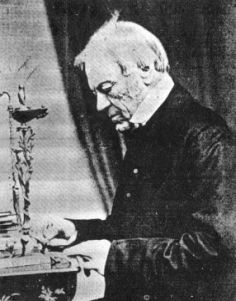Some Biogeographers, Evolutionists and Ecologists:
Chrono-Biographical Sketches
Richardson, Sir John (Scotland-England
1787-1865)
exploration, natural history
 from Wikipedia.org |
Richardson led an impressive triple-life as a physician, Arctic explorer, and naturalist. Early training as a surgeon led him to an eight-year stint with the British navy, where he saw action in several different campaigns (including the War of 1812) and was cited for bravery. For most men this period would have been the adventure of their life, but on returning home Richardson completed his M.D. and three years later was assigned as physician and naturalist to the first John Franklin expedition. Over the next three years he made his way over more than five thousand miles of Canadian Arctic terrain, amid great hardships (many in the party died, and he even had to execute one of them himself); a second expedition under Franklin was completed a few years later, with greater success. On returning to England this time, Richardson settled down to a life of medical administration and natural history study and writing: his Fauna Boreali-Americana became the first important faunal survey of northern North America. Under his guidance the facility at Haslar became an important center for natural history studies as well as medical research; Richardson himself became especially well known as an ichthyologist, and served as a mentor and/or advisor to many younger naturalists (including Darwin and Huxley). In 1847, John Franklin disappeared in the Arctic and Richardson--at the age of sixty--attempted a rescue mission (but Franklin was never found). He retired as a naval surgeon in 1855, after having also made a number of important contributions to the medical profession in the areas of nursing care (he was a friend of Florence Nightingale), treatment of the mentally ill, and disease etiology. |
Life Chronology
--born in Dumfries, Scotland, on 5 November 1787.
--1801-1807: studies medicine and natural history subjects at the University
of Edinburgh
--1804-1806: house surgeon, Dumfries and Galloway Royal Infirmary
--1807-1815: assistant surgeon/surgeon in the British navy, in the North
Atlantic, Mediterranean, and Baltic Sea
--1816: completes his M.D. at Edinburgh
--1819-1822, 1825-1827: member of the Arctic Exploring Expeditions, under
John Franklin
--1824-1828: surgeon to the Chatham division of the Marines
--1825: elected to the Royal Society of London
--1828-1838: chief medical officer, Melville Hospital, Chatham
--1829-1837: publishes his Fauna Boreali-Americana in four volumes,
with W. Swainson and W. Kirby
--1837: publishes "Report
on North American Zoology" in the Report of the British Association
for the Advancement of Science for 1836
--1838-1855: senior physician, Royal Naval Hospital, Haslar
--1840-1855: inspector of hospitals for the Admiralty
--1846: knighted by Queen Victoria
--1848-1849: leads the search for John Franklin in the Arctic
--1851: publishes his Arctic
Searching Expedition, in two volumes
--1856: receives the Royal Medal of the Royal Society of London
--1857: honorary LL.D., University of Dublin
--1861: publishes his The
Polar Regions
--dies at Grasmere, Westmorland, England, on 5 June 1865.
For Additional Information, See:
--Biographical Dictionary of American and Canadian
Naturalists and Environmentalists (1997).
--Oxford Dictionary of National Biography, Vol. 46 (2004).
--Dictionary of Canadian Biography, Vol. IX (1976).
--Sir John Richardson: Arctic Explorer, Natural Historian, Naval Surgeon
(1976).
--British Medical Journal, No. 3654 (17 January 1931): 110-112.
--Canadian
Medical Association Journal, Vol. 100(11) (1969): 531-534.
*
*
*
*
*
Copyright 2005 by Charles H. Smith. All rights
reserved.
http://people.wku.edu/charles.smith/chronob/RICH1787.htm
Return to Home/Alphabetical Listing by Name
Return to Listing by Country
Return to Listing by Discipline